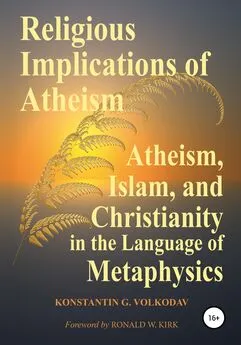Konstantin Volkodav - Religious Implications of Atheism
- Название:Religious Implications of Atheism
- Автор:
- Жанр:
- Издательство:неизвестно
- Год:2021
- ISBN:978-5-532-95383-3
- Рейтинг:
- Избранное:Добавить в избранное
-
Отзывы:
-
Ваша оценка:
Konstantin Volkodav - Religious Implications of Atheism краткое содержание
Religious Implications of Atheism - читать онлайн бесплатно ознакомительный отрывок
Интервал:
Закладка:
Krauss: So, it is not saying, “We belief that.” An atheist can say, “This myth is unconsent with this myth, or this myth is unconsent what we know about the universe. And therefore, it is unlikely it be true.” So, the atheism is just saying, “This is unlikely to be true.” It is not a belief system . . .
Comment 14
It is obvious (and there are many examples of this) that both among atheists and among adherents of any religion, there are both genius scientists and people who are completely ignorant and even stupid. Faith or disbelief does not depend on knowledge or intellect, but on the state of the soul. Atheists are reluctant to admit this obvious fact.
Krauss and other atheists try to make things seem like they alone have a “monopoly” on reason and common sense. They argue that people have been mistaken for thousands of years in absolutely everything, and only atheists (who have appeared quite recently by historical standards) act reasonably. However, this is not true. For example, the theory of the multiverse has no more scientific evidence than the existence of Zeus or Thor. Then why is it better than any other long-standing invention of humankind?
In fact, there are a lot of myths in politics, science, and culture. Myths are everywhere. Of course, it is good when a person “turns on the brain” and thinks reasonably. The trouble happens when at the same time everything else that is characteristic of a person is turned off.
All over the world, religious people were looking for wisdom and engaged in science long before atheists. Indian, Arabic, and ancient Greek mathematicians made great contributions to mathematics thirty five thousand years ago, when there were no atheists. Yes, their religious views were sometimes wrong. However, the scientific views of the same time were also erroneous. Many scientific theories have over time been refuted, and they could be called “fictions” and “myths”.
The thesis that atheism is not a belief system is also wrong. In the USSR and other communist countries, atheism was a belief system. A lot of literature has been written on this topic. On the other hand, it is absolutely wrong to identify all religions only with a belief system. This is oversimplification. It is like looking at the world through a small hole covered by a thick light filter. Only a small part of the complete picture will be visible, and only in one color.
Sharpie looks at the world through the prism of probability theory. However, not all people are like that, and the theory of probability is not applicable everywhere. Let us say that Krauss meets a young man with a burning gaze, and he will happily tell that he has fallen in love with a girl. “She is beautiful, the one and only,” the young man will say. Suppose, Krauss will reply, “Your statement is ridiculous. There are hundreds of millions of girls in the world with exactly the same shapes, with exactly the same physiology. There is nothing special about it. Moreover, hormones, brain substances, and social patterns trigger your emotions. Therefore, the likelihood that your statement is true is low.” Will Krauss leave unbeaten after that? Great question!
Krauss’s picture of the world is dull and uncheerful. This is the picture of formulas and equations. This is a world without love, without spiritual achievement, without spiritual enlightenment. Everything in it is subject to the theory of probability, the impersonal laws of physics and chemistry. It has no purpose, no meaning.
Krauss’s theses testify to his complete lack of understanding of the essence of the issue. Religions are, first of all, spiritual states that defy description and cannot be expressed in words. Moreover, no science can say anything about them. Even religious scholars who study any religion from its texts, but have not experienced its spiritual experience, cannot adequately describe it. They are like people studying musical notation, but not knowing how they sound.
Christian ascetics and Islamic Sufis said that their goal was the comprehension of the Truth. In addition, this goal can be achieved not through reason, logic, and reasoning, but only with the help of love, conscience, and purity of heart. [34] . Hereinafter, everywhere by “heart” we mean a metaphor meaning a certain spiritual center or spiritual depths of a person. This metaphor is used very often in the Bible. In general, the “heart” in it is often called the center or depth. For example, “For just as Jonah was three days and three nights in the belly of the sea monster, so for three days and three nights the Son of Man will be in the heart of the earth” (Matt. 12:40). It is obvious that the Earth does not have a heart (as a physical organ), but has depth.
In a state of spiritual imperfection, in an abnormal state, people are not able to see things as they really are. An imperfect person, due to his imperfection, without even realizing it, perceives the truth as distorted, and not as it really is.
Yet, Krauss never said, in what way is Islam or Christianity or Judaism contrary to what we know about the universe? He did not say because they did not contradict anything. So all Krauss’s accusations are unfounded.
On the other hand, Krauss’s argument can be rephrased in relation to atheism. Atheism is not unique. Everything has been said thousands of years ago. Even the ancient sophists wrote down all possible lines of thought, long before Krauss. Moreover, atheism can also be called one of a thousand religions. After all, religious people have always looked for common sense and engaged in science. Moreover, the penchant for myths is a feature of culture and psychology. There have been and are myths in science too.
[00:36:51] Krauss: The first part of the false promise is that Islam is special. Not special at all . . . It is just like all the rest.
Comment 15
Krauss did not study Islam, and he cannot say how Islam is similar to other religions. Therefore, all of his statements about the similarity of religions are groundless and fundamentally wrong. Although in Islam there are some borrowings from Christianity, Neo-Platonism, and Buddhism, the presence of some borrowings from three religions does not at all mean similarity with all. If we talk about Christianity, then everything in it is connected with the Incarnation from beginning to end (Matt. 16:15–18). This is the meaning of the creation of the world, and the meaning of human life. There is nothing like this in any religion.
[00:37:00] Krauss: And atheism is not a religion. It is just, in fact, it could be described as “common sense”. Ok? What make sense? I will think that those things that make sense are likely, and others things that do not make sense are unlikely prefer to assume that rationally understood events are probable, while are unlikely. In fact, science is all about. Okay . . .
I am an educator (may be it is flaw, but it is that it is). That means I believe in actually trying illuminate ideas and lead to discussion, critical thinking, and eventually learning things and increase in knowledge. Debates are not made for that. Debates are rhetorical devises . . .
[00:38:20] Krauss: So, the first thing I want to say, however, I want to clear some misconceptions. This idea of deductive arguments, which sounds good, is not the way we learn about reality. Okay. Deductive argument is just do not work. It leads to irrational actions. In fact, if we discuss “what common sense is?” The common sense is taking your beliefs to conform of the evidence of reality so you make rational actions.
Comment 16
Socrates and Plato would say the same thing about religion that it’s just common sense, and aligning your beliefs with reality data to perform rational actions. By the way, in the Byzantine era they were portrayed in the vestibules of churches and were called “Christians before Christ”, since long before Christianity they presented some Christian theses. Note that no angel from heaven said anything to Socrates and Plato. They made their conclusions solely based on logical reasoning and common sense.
In the Bible, the word “wisdom” occurs over two hundred times. For example, King Solomon wrote, “Get wisdom; get insight: do not forget, nor turn away from the words of my mouth. Do not forsake her, and she will keep you; love her, and she will guard you. The beginning of wisdom is this: Get wisdom, and whatever else you get, get insight. Prize her highly, and she will exalt you; she will honor you if you embrace her” (Prov. 4:5–8). Moreover, in the book of Ecclesiastes it is written, “Applied my mind to seek and to search out by wisdom all that is done under heaven; it is an unhappy business that God has given to human beings to be busy with” (Eccl. 1:13).
Thus, atheists have no monopoly on common sense. In Christianity and Islam a lot is said about the search for truth and wisdom. Therefore, as much as Krauss would like, in this respect atheism is not something unique. In fact, science was born and grew up in the religious tradition.
On the other hand, common sense and rational actions are not the only and universal tools for cognizing reality. Is it possible to love or compose music, poetry, paint pictures, relying only on common sense and rational actions? Of course not.
[00:38:51] Krauss: If you force reality conformed to your beliefs, you make irrational actions. So, you could do things, based on your beliefs, on your a priori beliefs . . . For example, your a priori belief could be that if you pray to Allah, then you can jumping out of the fourth storey from window of this building and you will land safely. Okay? That could be a priori belief . . . And, in fact, you could deduce based on all your beliefs and all of the evidence that you are a good person, and Allah would takes care of you, or whatever you call it, and you will be fine. I would take the elevator down. And only one of us could be walking at the end. That is not deductive. It is based on empirical evidence. Ok.
Comment 17
Neither Tzortzis, nor any other Muslim, jump out of windows, but ride down the elevator. The example is not relevant. Moreover, this is stupidity and slander. In addition, it is he, Krauss, who tries to deduce facts from his beliefs, a priori beliefs. Krauss did not have any mystical experience, and therefore his a priori conviction is the belief that there is no God. Nevertheless, Krauss’s empirical data is completely insufficient to draw any conclusions by the method of induction.
[00:39:35] Krauss: So, arguing that something does not makes sense to you, is based on the fact, the assumption that you know what is sensible in advance. But we do not know what is sensible in advance until we explore the world around us. Our common sense arise, in the fact, on the savanna in Africa to avoid lions, not to understand quantum mechanics, for example.
Comment 18
Krauss never ceases to amaze. I would like to believe that he is sincerely mistaken, and not maliciously. However, it is difficult to imagine how a person in their right mind could say that. According to Krauss and other atheists, the universe, and all of its contents, arose from random processes. However, at no stage in the chain of random processes can a purpose appear. Randomness and purpose are two opposites. Atheistic evolution, because of a chain of random processes, is blind and meaningless, and it cannot lead to the emergence of purpose and meaning. It is impossible to reasonably explain how hydrogen atoms were able to accidentally self-organize into living creatures that have desires, purposes (for example, not to be caught by a lion) and some “common sense”.
Читать дальшеИнтервал:
Закладка:

![Константин Бальмонт - Константин Бальмонт и поэзия французского языка/Konstantin Balmont et la poésie de langue française [билингва ru-fr]](/books/613502/konstantin-balmont-konstantin-balmont-i-poeziya-frantsuzskogo-yazyka-konstantin-balmont-et-la-po-sie-de-langue-fran-aise-bilingva-ru-fr.webp)






